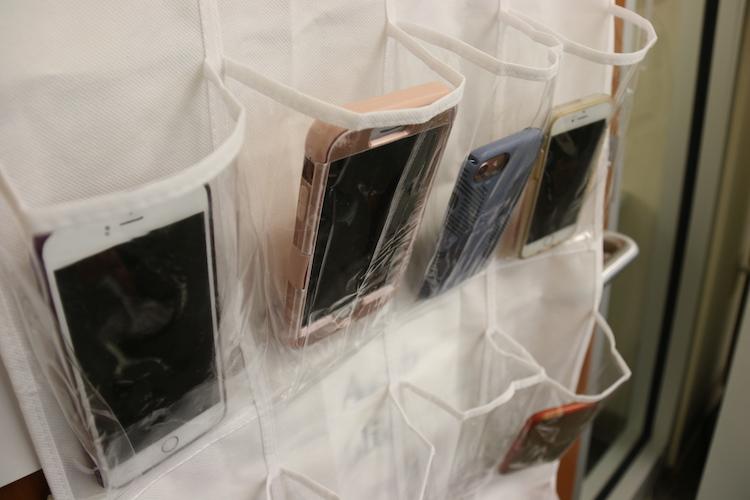Phones are a constant presence in our lives. We use them to scroll through our social media feeds, text our friends and look up things on the Internet. But a question has arisen: what is a phone’s role in the classroom?
In previous school years, having phones out during class was generally frowned upon, with some teachers being more lax on the subject and some more rigid. However, the 2017-2018 school year brings a new wave of enforced phone rules. Teachers such as math teacher Jessica Chu and history teacher Tracy Walder have designated spaces to put phones, like shoe racks or cubbies, and other teachers just request that they be turned off and in students’ backpack.
Part of the reason why teachers are now requesting phones to be set aside or in specific parts of the classroom is because of Honor Code violations. Upper School history teacher Lucio Benedetto has tightened up his policy a bit this year, but hasn’t decided to collect phones daily.
“The only time I’ll take up phones is when we’re having a test,” Benedetto said. “Sometimes people are leaving during tests with their phones and going to the bathroom and looking up notes or answers.”
But some other teachers who have experienced significant trouble regulating phone usage in their classrooms have decided to enforce the phone policy this year. Upper School history teacher Tracy Walder has hung up a shoe rack in her room (pictured above), asking students to place their phones in the rack during class. And surprisingly, students seem to enjoy it.
“The girls are awesome after I started using this rule. They know exactly where to go put their phones, and they are almost always there by the time I get in the classroom. It has became second nature to the girls,” Walder said.
Similarly, Upper School math teacher and Form III Dean Jessica Chu has a phone “cubby” in her room, with slots the perfect size for cell phones.
“I hope it can help the girls to realize that they don’t need to be depended on their phones,” Chu said. “I hope people realize the value of interacting in person rather than depending on technology, and it will also be a life lesson for them.”
Some students welcomed this initiative, while others were skeptical. Junior Jojo Gum thinks the new phone rules may be unnecessary.
“I didn’t see a problem before [regarding phone usage], so I’m not sure why they decided to enforce the phone policy,” Gum said.
On the other hand, junior Maddie McBride thinks enforced phone rules may be beneficial in the classroom.
“I feel very productive now that I have to put my phone away,” McBride said. “In Ms. Chu’s class, we also get an extra point on our tests if we put it in [the cubby].”
The decisions to regulate phone usage in their classrooms has been a personal decision for most teachers. The ways different teachers have chosen to handle this problem stems directly from how much phone usage has been a problem in the past.
“Mr. Murray, at one of our last faculty meetings, left it up to teachers. If we felt like we needed to go past our policy [regarding phones], we could,” Benedetto said. “It was left up to faculty to figure out how they wanted to handle that in their individual classrooms.
Ponette Kim – Asst. News Editor
Emily Wu – Staff Writer
Photo by Emily Wu








